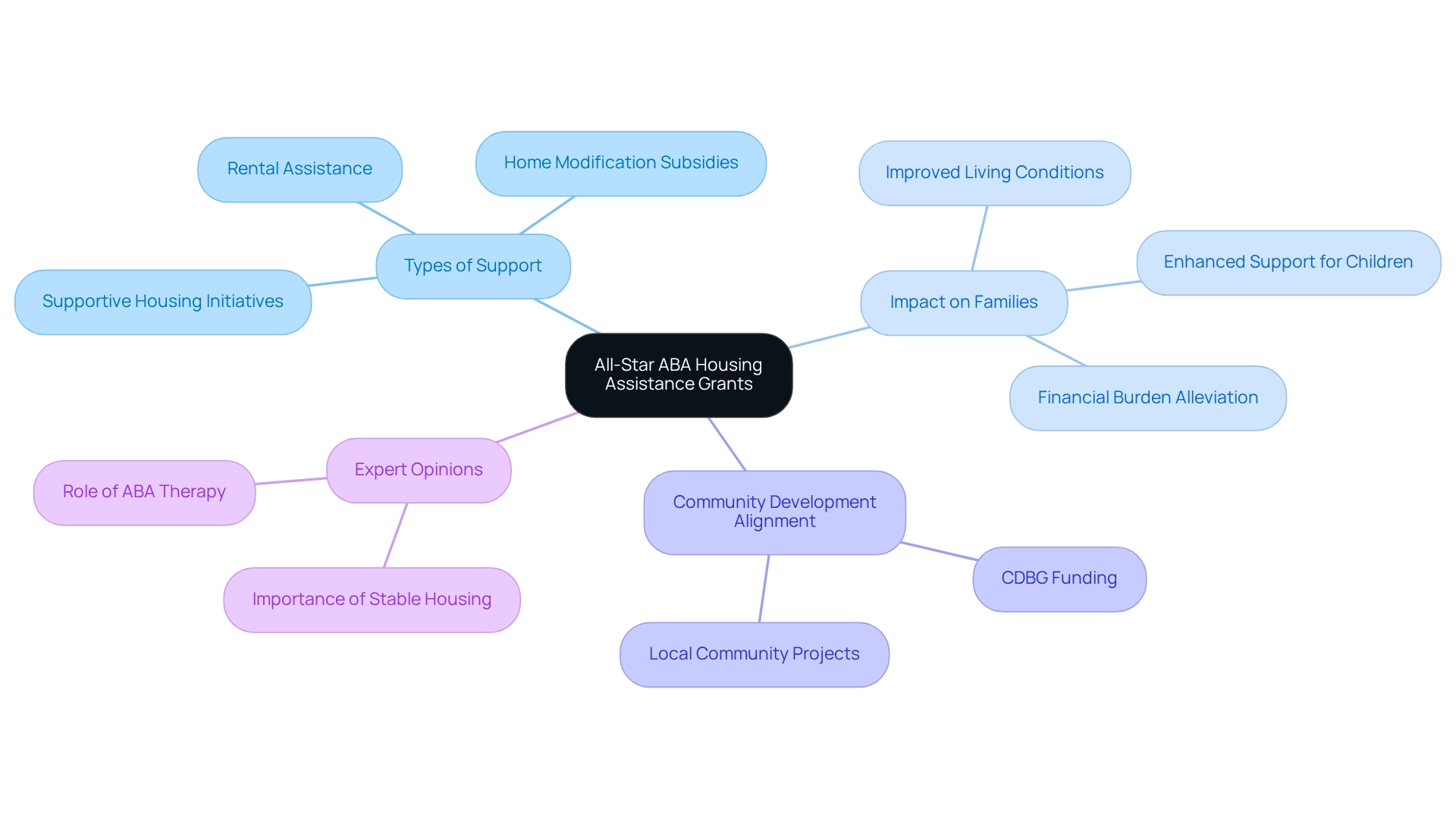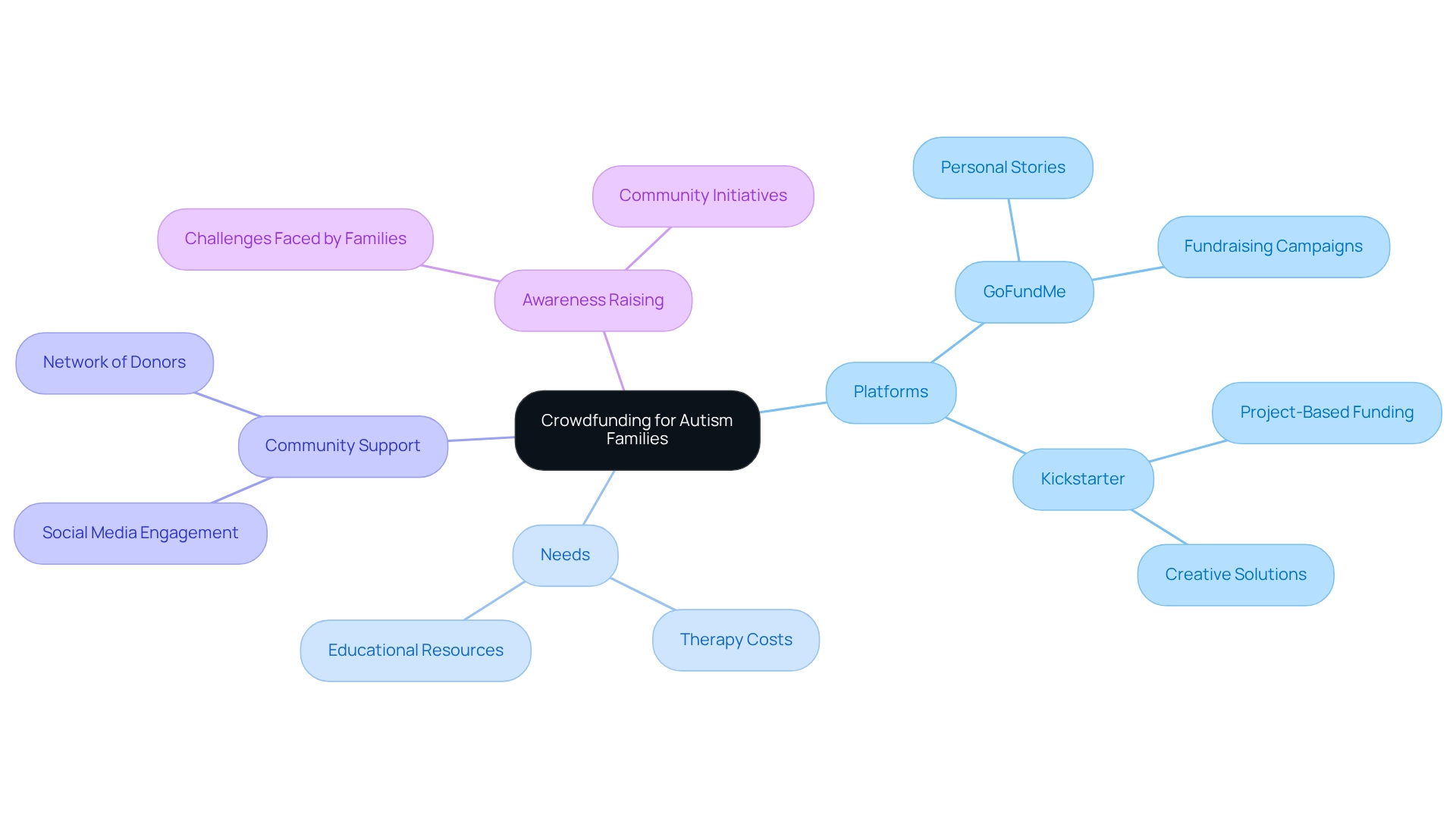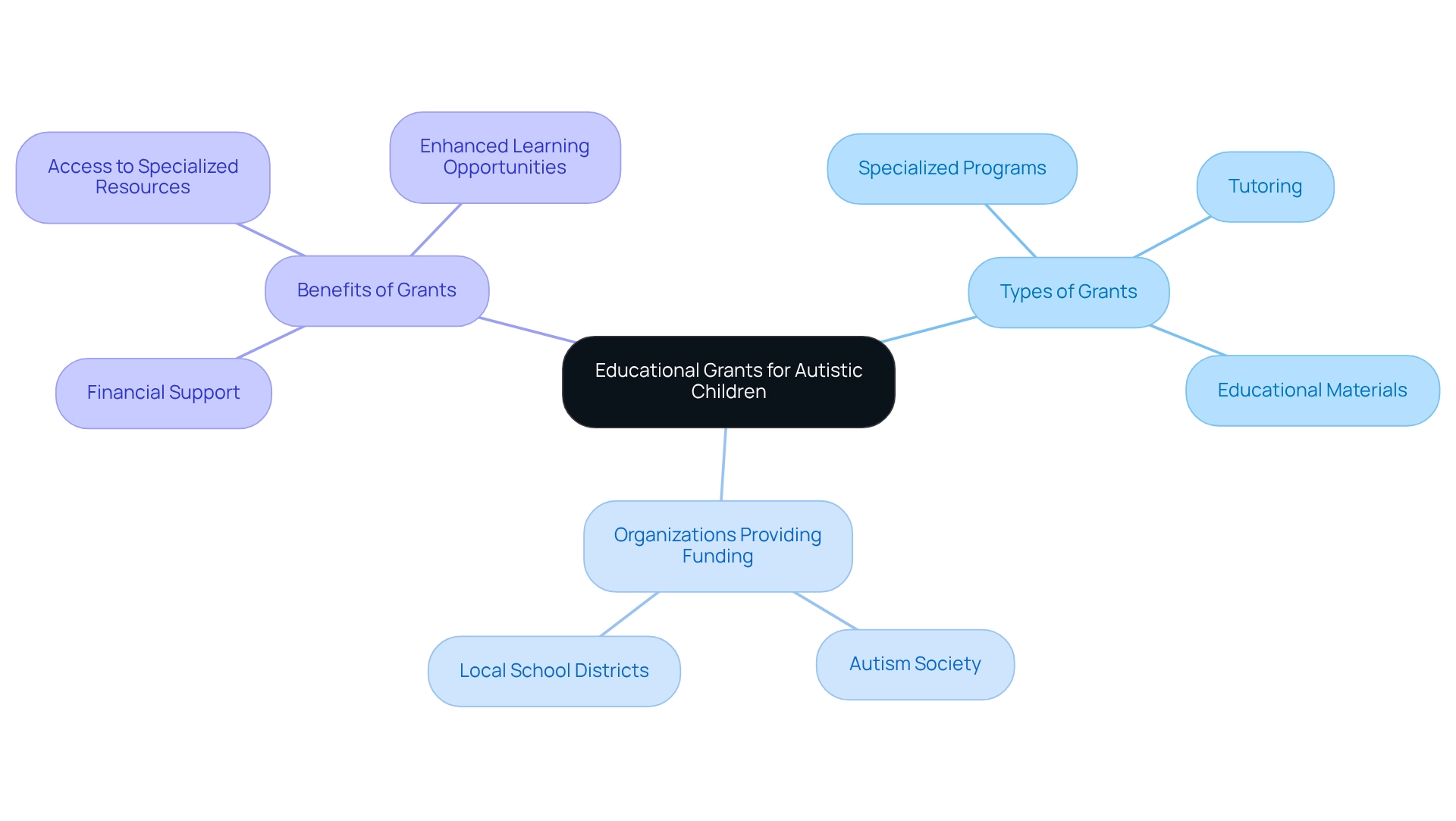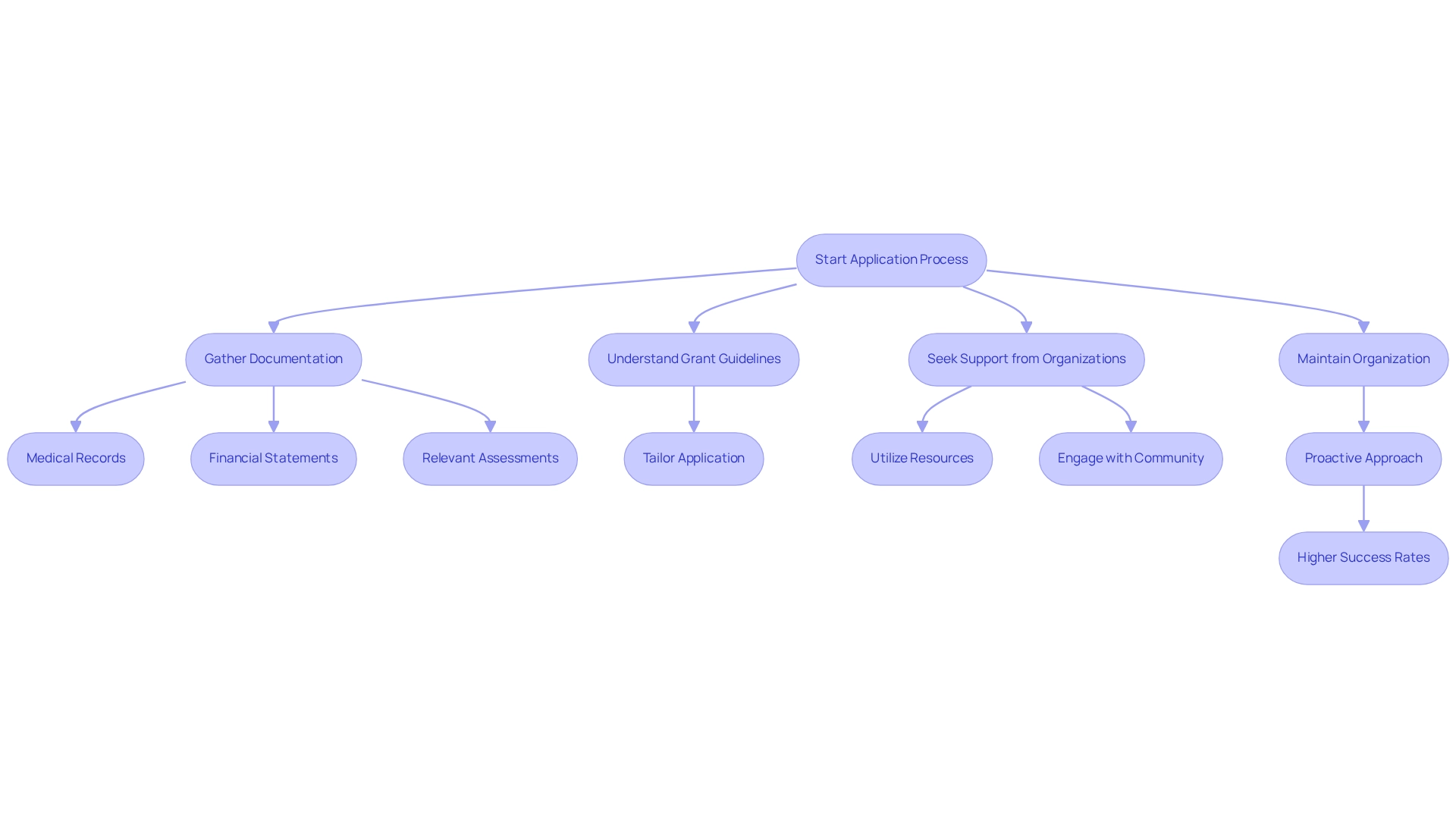Overview
This article shines a light on the vital grants available for families with autistic children, showcasing ten different funding opportunities designed to support their unique needs. It’s important to recognize how these grants, offered by compassionate organizations like Autism Speaks, the Flutie Foundation, and various government programs, play a crucial role in easing the financial burdens associated with therapy, education, and essential living expenses. By alleviating these pressures, these resources significantly enhance the overall well-being of autistic individuals and their families.
As parents navigate the challenges of raising a child with autism, the support provided through these grants can be a lifeline. Imagine the relief of knowing that financial assistance is available to help cover therapy costs or educational resources that can make a difference in your child's development. Each grant represents not just funding, but a commitment to fostering a brighter future for families.
We encourage you to explore these opportunities and consider how they might benefit your family. Sharing experiences and insights can create a supportive community, so feel free to comment or reach out through newsletters. Together, we can ensure that no family feels alone in this journey.
Introduction
In the intricate landscape of autism support, families often find themselves navigating a myriad of resources designed to enhance their children's development and well-being. It can feel overwhelming, but rest assured, there are many options available to empower those affected by autism.
From specialized grants and financial assistance programs to community-based support networks, a wealth of opportunities exists.
This article delves into the various avenues available, highlighting organizations that provide critical funding, innovative solutions, and invaluable guidance.
By exploring these resources together, families can unlock opportunities that not only alleviate financial burdens but also foster a nurturing environment for their children to thrive.
About ASD Media: Empowering Families with Resources for Autism Support
At ASD Media, we are committed to enhancing the application of Applied Behavior Analysis (ABA) therapy. Our mission is to provide essential insights and strategies that empower individuals to overcome challenges and improve their outcomes. We offer a wide range of resources designed for both parents and professionals, creating a nurturing community where experiences can be shared and knowledge exchanged. By subscribing to our newsletter, families can access the latest news and unlimited digital resources, unlocking the potential of youth with autism and ADHD.
Our mission goes beyond simply providing resources; we strive to equip parents and professionals with effective strategies for managing challenging behaviors, navigating support services, and fostering social skills development. Recent trends highlight the growing recognition of the vital role community support plays in the ABA therapy landscape. Studies show that families engaged in supportive networks report higher satisfaction and better results for their children. In fact, families involved in community support initiatives have seen a 30% increase in overall satisfaction with their children's therapy.
The upcoming release of the 3rd edition of the ASD Practice Guidelines on April 29, 2024, underscores our commitment to informed practices in the field. These guidelines, available free of charge for educational and research purposes, serve as an invaluable resource for stakeholders, including healthcare funders and service providers. As emphasized by [[[the Council of Autism Service Providers, "It is important for all stakeholders, including those receiving and providing services, coordinating care, administering funding, or building provider networks, to understand the essential elements of ABA." By fostering collaboration and growth within the ABA therapy community, ASD Media plays a pivotal role in enhancing the lives of families with autistic individuals by providing grants for autistic children.
Autism Speaks: Comprehensive Grants for Families with Autistic Children
Autism Speaks provides a compassionate range of grants for autistic children designed to support their families. Notably, the Autism Cares Grant offers grants for autistic children, providing up to $500 for households experiencing financial hardships. In 2025 alone, Autism Speaks has positively impacted thousands of families through its funding initiatives, showcasing a commitment to enhancing the lives of those in the neurodiverse community. Additionally, the organization has dedicated over $4 million in Local Impact Grants to programs that directly support individuals with autism.
The passage of the Autism CARES Act of 2024 marks a significant step forward in advocating for autism-related legislation, underscoring the importance of these funds. Families can find detailed information about these funding opportunities, including the application process and eligibility criteria, on the Autism Speaks website. This transparency empowers families to navigate available resources effectively and optimize their support options.
As one grant recipient shared in 2023, "I greatly appreciate the assistance you have provided to us," which highlights the tangible impact of these grants. Success stories from families benefiting from grants for autistic children further illustrate the positive outcomes and inspire others to seek assistance.
Flutie Foundation: Tailored Financial Support for Autism Families
At the Flutie Foundation, we understand the unique challenges faced by families impacted by autism. Our tailored financial support includes various programs, such as Joey's Fund and grants for autistic children like the Autism Community Impact Grant. These initiatives are designed to provide direct financial aid to households in need, including grants for autistic children to help with essential expenses like therapy, medical costs, and other necessary services.
Our commitment to assisting individuals affected by autism ensures that families can access the resources vital for their children's growth and well-being. We believe that every child deserves the opportunity to thrive, and we are here to support you on this journey. If you find yourself in need, we encourage you to explore our programs and see how we can help you and your family.
All-Star ABA: Housing Assistance Grants for Families with Autistic Children
All-Star ABA provides specialized housing support grants for autistic children, addressing the unique financial challenges their households encounter. These funds aim to cover essential expenses such as housing modifications, rent, and other living costs that arise from the specific needs of individuals on the spectrum. By alleviating financial burdens through grants for autistic children, All-Star ABA allows families to concentrate on the care and development of their children.
In 2025, over 1,000 households have benefited from these funds, with many families reporting improved living conditions and enhanced support for their children. The program not only facilitates necessary home adjustments but also provides rental assistance, ensuring families can maintain stable housing. This initiative aligns with the Community Development Block Grants (CDBG), which finance local community projects, including housing construction and renovation for individuals with disabilities.
Case studies illustrate the impact of these funds, showcasing families that have successfully navigated the application process and received financial support for crucial home modifications. Available housing support includes:
- Rental assistance programs
- Home modification subsidies
- Supportive housing initiatives
All are vital for meeting the diverse needs of families.
Experts emphasize the importance of grants for autistic children, noting that stable housing is key to the well-being of individuals with autism. As ASD Media states, "ABA therapy helps improve listening and following directions," underscoring the essential role a stable home environment plays in fostering therapeutic success.
Overall, All-Star ABA's commitment to providing housing support funding, including grants for autistic children, is instrumental in helping families create nurturing environments that promote their children's growth and development.

Government Programs: Financial Grants for Autism-Related Expenses
Many government initiatives aim to provide financial assistance through grants for autistic children to support families facing autism-related expenses. One essential resource is the Supplemental Security Income (SSI) program, which offers monthly benefits that can significantly alleviate the financial burden on low-income households. In 2024, the highest monthly SSI benefit is expected to be $943, while the complete benefit for minors with special needs is set at $841, depending on individual circumstances. It's crucial for families to understand that parental income may impact the actual amount received, making it important to grasp their eligibility.
Medicaid also plays a vital role in supporting families by covering various healthcare costs, which can be more than four times higher for children with developmental disorders than for those without. This financial assistance is essential for accessing necessary therapies and services. Recent updates indicate that Medicaid continues to evolve to better assist families, ensuring that critical services remain available.
Furthermore, the Temporary Assistance for Needy Families (TANF) program provides significant support to families, helping them meet basic needs while navigating the challenges associated with developmental disorders. Recent data shows that approximately 1.5 million families benefit from TANF, underscoring its importance in the support landscape for individuals with developmental disorders.
Families are encouraged to explore these options through local government websites, where they can find detailed information on eligibility criteria and application processes. As highlighted in various case studies, personalized care plans are crucial for maximizing the benefits of these programs. Families looking to understand these options can discover more about applying and eligibility through the respective organizations. Success stories from families utilizing TANF and other government programs illustrate the positive impact of these resources, showcasing how tailored support strategies can enhance overall quality of life. By leveraging grants for autistic children, families can more effectively manage the expenses related to developmental disorders and improve their overall well-being.
Local and State Organizations: Community-Based Grants for Autism Support
Many local and state entities are devoted to providing community-focused funding, including grants for autistic children, that significantly assists families impacted by developmental disorders. These grants for autistic children can be used to address a variety of needs, including therapy costs, educational resources, and other essential supplies. Families are encouraged to connect with local autism advocacy organizations and state health departments to explore grants for autistic children and understand the application processes. Engaging with these community resources not only provides financial support but also fosters meaningful relationships with other families facing similar challenges. As one parent wisely noted, "I don’t always have all the answers, but I do have Google," emphasizing the importance of leveraging local resources for funding information.
Furthermore, expert opinions highlight the crucial role of state organizations in supporting autism households. For example, O. Ivar Lovaas remarked, "If they can't learn the way we teach, we teach the way they learn," illustrating the necessity for personalized support. These organizations often collaborate with local advocacy groups to streamline access to grants for autistic children and ensure that families receive the essential assistance they need. Recent updates indicate that funding proposal writers should prepare for submissions through platforms like Grants.gov, which serves as a centralized hub for funding opportunities such as grants for autistic children, and OpenGrants, which provides tools for research and expert collaboration.
Success stories abound, showcasing individuals who have thrived through community-based autism support. For instance, one family shared their experience of obtaining grants for autistic children that allowed them to access crucial therapy services, significantly enhancing their child's development. These narratives not only inspire hope but also highlight the importance of an inclusive society that values neurodiversity. By utilizing these resources, families can access opportunities that enhance their child's development and overall well-being.
Nonprofit Organizations: Scholarships and Grants for Autism Families
A range of nonprofit groups is dedicated to supporting families with autistic children through grants for autistic children and funding. The National Autism Association's Helping Hand Program stands out by providing one-time grants to families facing significant financial challenges, especially for applicants under 21 years old. In 2025, this program has awarded numerous scholarships, showcasing the growing commitment of nonprofits to assist those in need. Furthermore, organizations like the Autism Science Foundation offer financial support specifically for educational and therapeutic needs, enhancing the resources available to families.
This year, nonprofit organizations have allocated substantial funding to support families affected by autism, demonstrating a strong network of assistance. For instance, Best Buddies International exemplifies the impact of these initiatives by fostering social inclusion and creating meaningful opportunities for individuals with intellectual and developmental disabilities.
Families are encouraged to explore these nonprofit options thoroughly, as many organizations are actively working to develop scholarships and funding tailored to their unique needs. As one advocate beautifully stated, "Autism awareness is not only about understanding; it’s about accepting the differences and celebrating them." This sentiment underscores the importance of financial assistance in helping families navigate the challenges associated with neurodevelopmental disorders.
Success stories from families who have benefited from the Helping Hand Program highlight the transformative impact of these grants, illustrating how financial support can lead to better outcomes for youth with developmental disorders. By utilizing the resources provided by these nonprofits, families can access opportunities that significantly enhance their children's development and overall well-being.
Crowdfunding: Innovative Financial Solutions for Autism Families
Crowdfunding platforms like GoFundMe and Kickstarter offer innovative financial solutions for families with children on the autism spectrum. These platforms create opportunities for families to share their heartfelt stories and gather necessary funds for specific needs, such as therapy costs or educational resources. By harnessing the power of social media and community support, families can connect with a broader network of potential donors who are eager to lend a helping hand. This approach not only provides essential financial assistance but also nurtures community engagement and raises awareness about the challenges faced by these families. Together, we can make a difference.

Educational Grants: Financial Aid for Autistic Children's Education
Navigating the educational landscape for your autistic child can be challenging, but help is available. Educational funds, including grants for autistic children, are accessible to assist families in managing the costs associated with their child's education. Organizations like the Autism Society and local school districts often provide funding for specialized programs, tutoring, and educational materials that can make a significant difference.
As a parent, it’s essential to explore the resources at your disposal. Families should reach out to their schools or local autism organizations to inquire about grants for autistic children that provide educational funding. By doing so, you can ensure that you have access to the necessary support and resources that will aid in your child's learning journey. Remember, you are not alone in this; there are people and organizations ready to help you every step of the way.

Application Process: Navigating Grants for Families with Autistic Children
Navigating the application process for grants for autistic children can be a daunting journey for families. To enhance the likelihood of success, it's essential to start by carefully gathering all necessary documentation, including:
- Medical records
- Financial statements
- Relevant assessments
Understanding the specific guidelines of each grant for autistic children is crucial; tailoring the application to meet these requirements can truly make a difference.
Families are encouraged to seek support from local autism organizations and advocacy groups, which often provide invaluable resources and guidance throughout the application journey for grants for autistic children. For example, the Yes I Can! Foundation offers the Sara Conlon Memorial Scholarship for students with disabilities pursuing special education degrees, serving as a significant asset for many households. Engaging with these communities can provide insights into common pitfalls and best practices. As MyGOAL Inc. emphasizes, "Interactive activities are beneficial for the development of individuals, including camps and other services," underscoring the importance of community involvement.
Moreover, maintaining an organized approach and proactively addressing all aspects of the application can greatly enhance the chances of securing grants for autistic children. Statistics reveal that households utilizing accessible resources and support networks experience higher success rates in their funding applications. By leveraging these strategies, families can navigate the complexities of applying for grants for autistic children more effectively, ultimately securing the necessary support for their children's needs.

Conclusion
In the journey of supporting children with autism, countless resources and organizations stand ready to assist families in overcoming challenges. From financial grants provided by Autism Speaks and the Flutie Foundation to community-based support from local organizations and nonprofits, families have access to a diverse array of options that can significantly alleviate their burdens. Each of these organizations plays a crucial role in enhancing the quality of life for children with autism, offering tailored support that addresses specific needs, whether through housing assistance, educational grants, or specialized therapies.
Engaging with these resources not only provides financial relief but also fosters a sense of community and connection among families navigating similar experiences. The importance of collaboration and shared knowledge cannot be overstated; families who actively seek out and utilize these resources often report improved outcomes for their children. The rise of innovative solutions, such as crowdfunding, further exemplifies the community's commitment to supporting families in need, allowing them to share their stories and rally support from a broader audience.
Ultimately, the landscape of autism support is rich with opportunities to empower families and enhance the developmental journey of children on the spectrum. By leveraging these resources, families can create nurturing environments that promote growth, learning, and connection. It is essential to explore these avenues and take advantage of the wealth of support available, ensuring that every child has the opportunity to thrive in a supportive and understanding community.
Frequently Asked Questions
What is the mission of ASD Media regarding Applied Behavior Analysis (ABA) therapy?
ASD Media is committed to enhancing the application of ABA therapy by providing insights and strategies that empower individuals to overcome challenges and improve their outcomes.
What resources does ASD Media offer for families and professionals?
ASD Media offers a wide range of resources designed for both parents and professionals, fostering a nurturing community for sharing experiences and exchanging knowledge.
How can families benefit from subscribing to the ASD Media newsletter?
By subscribing to the newsletter, families can access the latest news and unlimited digital resources aimed at unlocking the potential of youth with autism and ADHD.
What strategies does ASD Media provide to help manage challenging behaviors?
ASD Media equips parents and professionals with effective strategies for managing challenging behaviors, navigating support services, and fostering social skills development.
What impact does community support have on families engaged in ABA therapy?
Studies show that families involved in community support initiatives report higher satisfaction and better results for their children, with a 30% increase in overall satisfaction noted.
What is the significance of the 3rd edition of the ASD Practice Guidelines?
The upcoming release of the 3rd edition of the ASD Practice Guidelines on April 29, 2024, emphasizes ASD Media's commitment to informed practices in the field and serves as a valuable resource for stakeholders.
What types of grants does Autism Speaks provide for autistic children?
Autism Speaks offers various grants, including the Autism Cares Grant, which provides up to $500 for households experiencing financial hardships, and over $4 million in Local Impact Grants for programs supporting individuals with autism.
How does the Autism CARES Act of 2024 impact families?
The passage of the Autism CARES Act of 2024 advocates for autism-related legislation and underscores the importance of funding opportunities available to families.
What types of financial support does the Flutie Foundation offer?
The Flutie Foundation provides tailored financial support through programs such as Joey's Fund and the Autism Community Impact Grant, which assist households with essential expenses like therapy and medical costs.
How can families access information about funding opportunities from Autism Speaks?
Families can find detailed information about funding opportunities, including the application process and eligibility criteria, on the Autism Speaks website.




